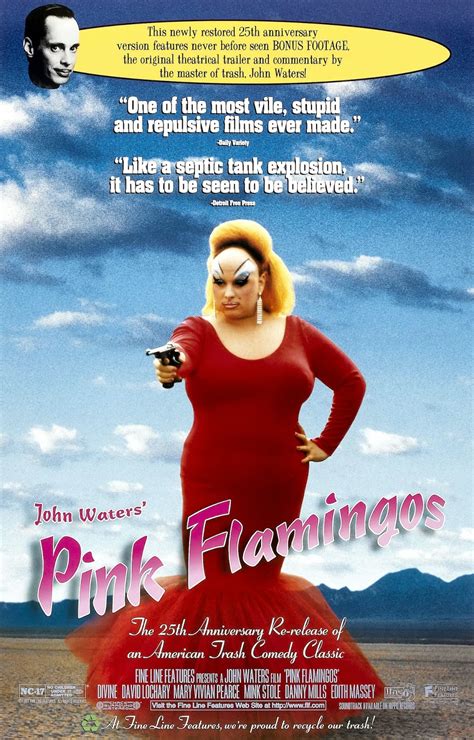Pink Flamingos

Description:
Pink Flamingos is a 1972 American transgressive black comedy film directed by John Waters. The film follows the lives of Babs Johnson, a criminal on the run, and her family, as they compete for the title of the 'filthiest person alive.' Notorious for its explicit and shocking content, the movie explores themes of identity, societal norms, and taboos in a satirical manner. It became a cult classic due to its outrageous scenes and subversive humor.Keywords:
Transgression, Shock, Satire, Counterculture, OutrageousWhat is the point of the Pink Flamingos movie?
"Pink Flamingos," directed by John Waters, is a cult film that explores themes of individuality, subversion, and societal norms. It follows Divine, a drag queen, and her eccentric family as they compete for the title of "the filthiest people alive." The film challenges conventional morality and celebrates sexual liberation, alternative lifestyles, and anti-establishment attitudes. With its shocking imagery and provocative content, it critiques the hypocrisy of mainstream culture while promoting self-acceptance and the celebration of difference.
What is the meaning behind Pink Flamingos?
"Pink Flamingos," directed by John Waters, is a cult film that explores themes of nonconformity, sexuality, and subversion of societal norms. The film follows Divine, a drag queen, as she competes for the title of "filthiest person alive" against a rival family. Its provocative content and shocking imagery challenge conventional morality and celebrate individuality and rebellion. The pink flamingo itself symbolizes kitsch and the absurdity of suburban life, serving as a backdrop for the film's exploration of identity and the grotesque.
What is the pink flamingo theory?
The "Pink Flamingo Theory" is a concept associated with John Waters' 1972 film "Pink Flamingos." It suggests that individuals can embrace and celebrate their identities, no matter how unconventional or taboo, much like the flamboyant pink flamingos that symbolize uniqueness and defiance against societal norms. The film itself showcases a range of eccentric characters who challenge traditional values, pushing boundaries of taste and morality. This theory encourages self-acceptance and the rejection of societal judgments, promoting a message of individuality and freedom.
Why does a flamingo lose its pink?
In "Pink Flamingos," the loss of a flamingo's pink color symbolizes the degradation of values and the decline of societal norms. In nature, flamingos lose their pink hue when their diet lacks carotenoids, the pigments found in the algae and crustaceans they typically consume. This metaphor reflects the film's themes of transgression and the challenge to conventional morality, showcasing characters who embrace their identities in shocking ways, contrasting with societal expectations. The flamingo's color serves as a visual representation of authenticity and societal judgment.
Explore More Categories: